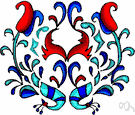motif
(redirected from motives)Also found in: Thesaurus, Medical, Legal, Financial, Idioms, Encyclopedia.
motif
recurring theme, subject, or idea: the motif of the song
Not to be confused with:
motive – motivation; ground; cause; reason: Her motive was questionable.
Abused, Confused, & Misused Words by Mary Embree Copyright © 2007, 2013 by Mary Embree
mo·tif
(mō-tēf′)n.
1.
a. A recurrent thematic element in an artistic or literary work.
b. A dominant theme or central idea.
2. Music A short rhythmic or melodic passage that is repeated or evoked in various parts of a composition.
3. A repeated figure or design in architecture or decoration. See Synonyms at figure.
4. A recurrent pattern either of molecular sequence, usually of nucleotides or amino acids in proteins, or of molecular structure that usually corresponds to specific biological activity.
[French, from Old French, motive; see motive.]
American Heritage® Dictionary of the English Language, Fifth Edition. Copyright © 2016 by Houghton Mifflin Harcourt Publishing Company. Published by Houghton Mifflin Harcourt Publishing Company. All rights reserved.
motif
(məʊˈtiːf)n
1. (Music, other) a distinctive idea, esp a theme elaborated on in a piece of music, literature, etc
2. (Literary & Literary Critical Terms) a distinctive idea, esp a theme elaborated on in a piece of music, literature, etc
3. (Art Terms) Also: motive a recurring form or shape in a design or pattern
4. (Clothing & Fashion) a single added piece of decoration, such as a symbol or name on a jumper, sweatshirt, etc
[C19: from French. See motive]
Collins English Dictionary – Complete and Unabridged, 12th Edition 2014 © HarperCollins Publishers 1991, 1994, 1998, 2000, 2003, 2006, 2007, 2009, 2011, 2014
mo•tif
(moʊˈtif)n.
1. a recurring subject, theme, idea, etc., esp. in a literary, artistic, or musical work.
2. a distinctive and recurring form, shape, figure, etc., in a design.
[1840–50; < French; see motive]
Random House Kernerman Webster's College Dictionary, © 2010 K Dictionaries Ltd. Copyright 2005, 1997, 1991 by Random House, Inc. All rights reserved.
ThesaurusAntonymsRelated WordsSynonymsLegend:
Switch to new thesaurus
| Noun | 1. |  motif - a design or figure that consists of recurring shapes or colors, as in architecture or decoration motif - a design or figure that consists of recurring shapes or colors, as in architecture or decoration |
| 2. | motif - a theme that is repeated or elaborated in a piece of music melodic theme, musical theme, theme, idea - (music) melodic subject of a musical composition; "the theme is announced in the first measures"; "the accompanist picked up the idea and elaborated it" | |
| 3. | motif - a unifying idea that is a recurrent element in literary or artistic work; "it was the usual `boy gets girl' theme" idea, thought - the content of cognition; the main thing you are thinking about; "it was not a good idea"; "the thought never entered my mind" topos - a traditional theme or motif or literary convention; "James Joyce uses the topos of the Wandering Jew in his Ulysses" |
Based on WordNet 3.0, Farlex clipart collection. © 2003-2012 Princeton University, Farlex Inc.
motif
noun
1. design, form, shape, decoration, ornament wallpaper with a rose motif
Collins Thesaurus of the English Language – Complete and Unabridged 2nd Edition. 2002 © HarperCollins Publishers 1995, 2002
motif
nounThe American Heritage® Roget's Thesaurus. Copyright © 2013, 2014 by Houghton Mifflin Harcourt Publishing Company. Published by Houghton Mifflin Harcourt Publishing Company. All rights reserved.
Translations
Collins Spanish Dictionary - Complete and Unabridged 8th Edition 2005 © William Collins Sons & Co. Ltd. 1971, 1988 © HarperCollins Publishers 1992, 1993, 1996, 1997, 2000, 2003, 2005
Collins English/French Electronic Resource. © HarperCollins Publishers 2005
Collins German Dictionary – Complete and Unabridged 7th Edition 2005. © William Collins Sons & Co. Ltd. 1980 © HarperCollins Publishers 1991, 1997, 1999, 2004, 2005, 2007
Collins Italian Dictionary 1st Edition © HarperCollins Publishers 1995